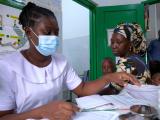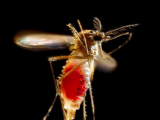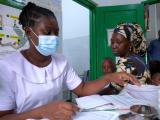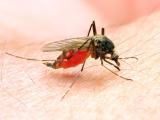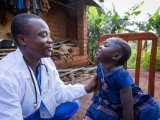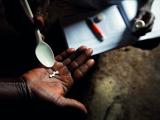Progress in easing the still-formidable malaria burden is threatened by drug resistance, though there is a narrow window of opportunity to reduce the threat with political leadership, key partnerships among countries and sectors of society, and more financial resources, according to a new report from a global policy group based in Washington, DC.
The 26-page report from the Center for Strategic and International Studies (CSIS) was published Nov 8 and authored by J. Christopher Daniel, PhD, a senior associate with the CSIS Global Health Policy Center. He is a retired US Navy captain who commanded the Naval Medical Research Center and its network of laboratories. CSIS produces analysis reports and initiatives to help guide defense and security policies.
Artemisinin combination therapy (ACT) and its greater availability to more populations have helped countries gain a foothold on driving down malaria infection rates and deaths, but resistance to artemisinin by the malaria parasite could be a major setback, especially because there is no next-generation drug on the horizon to replace it, according to the report. Daniel also credited targeted initiatives such as the World Health Organization's (WHO's) "Roll Back Malaria" program for speeding the decline in malaria illnesses and deaths.
The parasite has developed resistance twice before at the Thailand-Cambodian border: to sulfadoxine-pyrimethamine in the late 1960s and to chloroquine, which over several decades became nearly useless by the early 1990s, according to the report. Currently, resistance has been confirmed in Cambodia, Myanmar, Thailand, and Vietnam. It has also been detected in southwestern Chinese provinces that border Myanmar and is suspected in other countries, including Guyana and Suriname.
"What seems to be a localized threat could easily get out of control and have serious implications for global health," Daniel wrote, adding that the burden weighs heaviest on pregnant women and children in developing countries, but also remains a significant threat to US military personnel.
Key factors that drive resistance in Mekong basin countries include treating febrile patients without diagnostic test confirmation, misdiagnosis, underdosing, incomplete dosages, artemisinin monotherapy, treatment delays, and treatment with counterfeit or poor-quality drugs, the report said.
Daniels singled out two groups in the region who are especially vulnerable owing to their mobility and occupational exposure to infected mosquitoes: military troops deploying to remote border areas and migrant workers, who frequently cross borders and steer clear of public health access.
One of the challenges that will likely require political and private-sector coordination is the elimination of oral artemisinin-based monotherapy from circulation, one of WHO's priority goals, according to the report. Though many countries have withdrawn marketing authorization for monotherapies, 14 still allow them, and at least 31 companies still market them. However, in an encouraging development, Myanmar's military announced in June that it would stop producing monotherapy and will convert to ACT by early 2014.
Another obstacle is marshalling more financial support to battle artemisinin resistance. Despite a boost in funding, the WHO estimates that $300 to $350 million more is needed over the next 3 years, according to the report, which predicted that achieving and maintaining malaria elimination is less expensive than longer-term control efforts that are difficult to sustain in the face of such other global burdens as economic downturns and social upheaval.
Better supply-chain management to shore up the supply of diagnostic and treatment materials could help build trust in the region's public health sector, and more efforts are needed to engage the private sector—for example, financial incentives—to fill treatment and care voids, especially for marginalized populations, the report said.
A geographic hot spot that requires focused attention is Myanmar, where 7 of 10 people live in malaria-endemic areas against the backdrop of a chronically under-resourced health system, according to Daniel. He noted that the country's recent government reforms and improving relations with the United States provide an opening that could benefits millions of Myanmar citizens while also reducing the area's role in worsening the spread of artemisinin resistance.
The United States has a role to play in encouraging greater cohesion between Mekong countries and China, Daniels wrote. "Smart collaboration to combat artemisinin resistance would advance US national security interests while also advancing shared humanitarian interests."
See also:
Nov 8 CSIS drug-resistant malaria report


